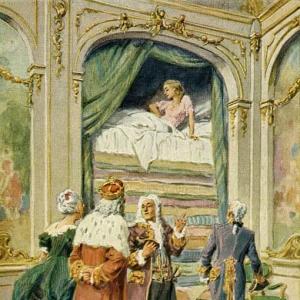Reading time for children: 9 min
Twelve servants who had done nothing all the day would not exert themselves at night either, but laid themselves on the grass and boasted of their idleness. The first said, „What is your laziness to me, I have to concern myself about mine own? The care of my body is my principal work, I eat not a little and drink still more. When I have had four meals, I fast a short time until I feel hunger again, and that suits me best. To rise betimes is not for me. When it is getting near mid-day, I already seek out a resting-place for myself. If the master call, I do exactly as if I had not heard him, and if he call for the second time, I wait awhile before I get up, and go to him very slowly. In this way life is endurable.“
The second said, „I have a horse to look after, but I leave the bit in his mouth, and if I do not want to do it, I give him no food, and I say he has had it already. I, however, lay myself in the oat-chest and sleep for four hours. After this I stretch out one foot and move it a couple of times over the horse’s body, and then he is combed and cleaned. Who is going to make a great business of that? Nevertheless service is too toilsome for me.“
The third said, „Why plague oneself with work? Nothing comes of it! I laid myself in the sun, and fell asleep. It began to rain a little, but why should I get up? I let it rain on in God’s name. At last came a splashing shower, so heavy indeed, that it pulled the hair out of my head and washed it away, and I got a hole in the skull. I put a plaster on it, and then it was all right. I have already had several injuries of that kind.“
The fourth said, „If I am to undertake a piece of work, I first loiter about for an hour that I may save up my strength. After that I begin quite slowly, and ask if no one is there who could help me. Then I let him do the chief of the work, and in reality only look on; but that also is still too much for me.“
The fifth said, „What does that matter? Just think, I am to take away the manure from the horse’s stable, and load the cart with it. I let it go on slowly, and if I have taken anything on the fork, I only half-raise it up, and then I rest just a quarter of an hour until I quite throw it in. It is enough and to spare if I take out a cartful in the day. I have no fancy for killing myself with work.“
The sixth said, „Shame on ye. I am afraid of no work, but I lie down for three weeks, and never once take my clothes off. What is the use of buckling your shoes on? For aught I care they may fall off my feet, it is no matter. If I am going up some steps, I drag one foot slowly after the other on to the first step, and then I count the rest of them that I may know where I must rest.
The seventh said, „That will not do with me; my master looks after my work, only he is not at home the whole day. But I neglect nothing, I run as fast as it is possible to do when one crawls. If I am to get on, four sturdy men must push me with all their might. I came where six men were lying sleeping on a bed beside each other. I lay down by them and slept too. There was no wakening me again, and when they wanted to have me home, they had to carry me.“ The eighth said, „I see plainly that I am the only active fellow. If a stone lie before me, I do not give myself the trouble to raise my legs and step over it. I lay myself down on the ground, and if I am wet and covered with mud and dirt, I stay lying until the sun has dried me again. At the very most, I only turn myself so that it can shine on me.“ The ninth said, „That is the right way! To-day the bread was before me, but I was too idle to take it, and nearly died of hunger! Moreover a jug stood by it, but it was so big and heavy that I did not like to lift it up, and preferred bearing thirst. Just to turn myself round was too much for me, I remained lying like a log the whole day.“ The tenth said, „Laziness has brought misfortune on me, a broken leg and swollen calf. Three of us were lying in the road, and I had my legs stretched out. Some one came with a cart, and the wheels went over me. I might indeed have drawn my legs back, but I did not hear the cart coming, for the midges were humming about my ears, and creeping in at my nose and out again at my mouth; who can take the trouble to drive the vermin away?“
The eleventh said, „I gave up my place yesterday. I had no fancy for carrying the heavy books to my master any longer or fetching them away again. There was no end of it all day long. But to tell the truth, he gave me my dismissal, and would not keep me any longer, for his clothes, which I had left lying in the dust, were all moth-eaten, and I am very glad of it.“
The twelfth said, „To-day I had to drive the cart into the country, and made myself a bed of straw on it, and had a good sleep. The reins slipped out of my hand, and when I awoke, the horse had nearly torn itself loose, the harness was gone, the strap which fastened the horse to the shafts was gone, and so were the collar, the bridle and bit. Some one had come by, who had carried all off. Besides this, the cart had got into a quagmire and stuck fast. I left it standing, and stretched myself on the straw again. At last the master came himself, and pushed the cart out, and if he had not come I should not be lying here but there, and sleeping in full tranquillity.“
 Learn languages. Double-tap on a word.Learn languages in context with Childstories.org and Deepl.com.
Learn languages. Double-tap on a word.Learn languages in context with Childstories.org and Deepl.com.Backgrounds
Interpretations
Adaptions
Summary
Linguistics
„The Twelve Idle Servants“ is a lesser-known fairy tale collected by the Brothers Grimm, who were German academics, linguists, cultural researchers, and authors. The story is part of their collection titled „Kinder- und Hausmärchen“ (Children’s and Household Tales), which was first published in 1812. The collection, commonly known as Grimm’s Fairy Tales, is a compilation of various folktales that the Brothers Grimm gathered from oral and written sources across Germany.
Jacob and Wilhelm Grimm were prominent figures in the German Romantic movement during the early 19th century. They aimed to preserve traditional German culture and folklore, which they believed was in danger of being lost due to modernization and urbanization. By collecting and publishing these tales, they sought to document and promote the cultural heritage of their country.
The Brothers Grimm are renowned for their contributions to the study of folklore, linguistics, and comparative mythology. Their fairy tale collections have had a lasting impact on Western literature, inspiring countless adaptations, retellings, and reinterpretations over the years. The tales, including „The Twelve Idle Servants,“ often contain moral lessons and explore themes such as the consequences of one’s actions, the importance of honesty and hard work, and the triumph of good over evil.
„The Twelve Idle Servants“ is unique among the Grimm’s Fairy Tales due to its focus on laziness and idleness rather than more common themes like bravery, love, or cleverness. The story serves as a cautionary tale, teaching readers about the potential negative consequences of laziness and the importance of a strong work ethic.
„The Twelve Idle Servants“ can be interpreted in several ways, with the most prominent themes being the consequences of laziness, the importance of work ethic, and the dangers of taking pride in idleness.
Consequences of laziness: Each servant’s laziness leads to various misfortunes and problems, such as injuries, loss of employment, or damaged property. This serves as a cautionary tale, warning readers that a lack of effort and responsibility can lead to negative consequences.
Importance of work ethic: The tale emphasizes the value of a strong work ethic and the need to take responsibility for one’s duties. The servants‘ idleness not only affects their own well-being but also causes problems for their masters and others around them. This theme encourages readers to be diligent and conscientious in their work to avoid similar outcomes.
Dangers of taking pride in idleness: The servants in the story boast about their laziness, as if it were an achievement to be proud of. This attitude can be seen as a critique of those who take pride in avoiding work or responsibilities, highlighting the potential harm that can come from such a mindset.
Social commentary: The tale can also be interpreted as a social commentary on the various attitudes towards work and responsibility in society. By presenting extreme examples of laziness, the Brothers Grimm may have been encouraging readers to reflect on their own work ethic and the potential consequences of neglecting one’s duties.
Satire: The exaggerated and humorous nature of the servants‘ laziness can be seen as a satirical take on human idleness and the absurdity of taking pride in such behavior. The story serves to mock those who avoid work and responsibilities, suggesting that their actions are foolish and self-destructive.
In summary, „The Twelve Idle Servants“ offers multiple interpretations that center around the themes of laziness, work ethic, and the consequences of neglecting one’s responsibilities. The story serves as a cautionary tale, emphasizing the importance of diligence and responsibility while also critiquing and satirizing those who take pride in idleness.
„The Twelve Idle Servants“ has been adapted into various forms of media over the years, including:
Children’s Books: There are numerous children’s books that adapt „The Twelve Idle Servants“ into a more accessible format for young readers. These books often simplify the language and make the story more visually appealing with illustrations.
Animated Films: The story has been adapted into several animated films, such as the 1956 Soviet film „The Twelve Months“ and the 1976 Hungarian film „The Twelve Idle Servants.“ These films often add their own unique twists to the story and use animation to bring the characters and settings to life.
Stage Plays: „The Twelve Idle Servants“ has been adapted into stage plays, particularly for children’s theater productions. These adaptations often feature music and dance to make the story more engaging for young audiences.
Video Games: The story has also been adapted into video games, such as the 2008 game „The Treasures of Mystery Island 2: The Gates of Fate,“ which features a quest to find magical golden apples.
Literary Works: „The Twelve Idle Servants“ has inspired various literary works, such as the 2009 novel „The Twelve Servants“ by Fiona Kidman, which adapts the story into a modern-day New Zealand setting.
These adaptations often add their own unique interpretations and twists to the original story, while still maintaining its core themes and values.
„The Twelve Idle Servants“ is a fairy tale by the Brothers Grimm that tells the story of twelve servants who take pride in their idleness and boast about their lack of effort and work.
The first servant boasts about how he overindulges in food and drink and avoids work by pretending not to hear his master’s calls. The second servant neglects his duty to care for a horse, instead sleeping in the oat-chest and doing the bare minimum to groom the animal. The third servant is so lazy that he doesn’t bother to move when it starts raining, resulting in a hole in his skull.
The fourth servant procrastinates and avoids work by enlisting others to do it for him, while the fifth servant takes an excessive amount of time to complete his tasks, such as removing manure from the stable. The sixth servant is so lazy that he doesn’t even bother to put on shoes or properly walk up steps.
The seventh servant only works when his master is present, otherwise he sleeps or relies on others to move him. The eighth servant is so inactive that he won’t even step over a stone in his path, choosing to lie down and wait to be dried by the sun instead. The ninth servant nearly dies of hunger and thirst because he is too lazy to reach for the food and drink right in front of him.
The tenth servant’s laziness results in a cart running over his legs, causing injury. The eleventh servant loses his job after neglecting his duties, resulting in his master’s clothes becoming moth-eaten. The twelfth servant falls asleep while driving a cart and loses the horse’s harness, leaving the cart stuck in a quagmire. He only gets out of the situation when his master comes to push the cart out himself.
In this tale, the Brothers Grimm showcase extreme examples of laziness and the consequences that can result from a lack of effort and responsibility. Each servant takes pride in their idleness, but their actions ultimately lead to various misfortunes and lost opportunities.
The fairy tale „The Twelve Idle Servants“ by the Brothers Grimm offers a satirical commentary on idleness through hyperbole and irony.
Here’s a linguistic analysis of the text:
Structure and Style
Repetitive Structure: The tale uses a repetitive pattern where each servant recounts their own experience of laziness. This structure emphasizes the universality of the theme and provides a rhythmic flow.
Dialogue-Centric: The story is heavily dialogue-driven, with each servant sharing their tale in a monologue. This gives each character a distinct voice and perspective, adding depth to their idleness.
Colloquial Language: The language is casual and conversational, reflecting the nonchalant attitude of the servants towards their responsibilities. Phrases like „What is your laziness to me“ and „Shame on ye“ contribute to this tone.
Hyperbole: Each servant’s account is marked by exaggerated descriptions of their laziness and the consequences thereof. This hyperbole serves as a humorous critique of sloth, making their laziness appear ridiculous.
Irony: The tale is rich in irony, particularly situational irony, where the outcomes of the servants‘ laziness lead to more work or trouble. For example, the first servant fasts between meals only to eat more, and the twelfth’s neglect results in the master’s intervention.
Imagery: Vivid imagery is used to depict the extreme laziness of the servants, such as lying in the oat-chest, getting drenched in rain, or having bread nearby but refusing to eat it. These images paint a picture of excessive slothfulness.
Themes and Social Commentary
Critique of Idleness: The story satirizes laziness, presenting it as not only unproductive but also self-destructive. The servants‘ anecdotes highlight the absurdity and impracticality of extreme sloth.
Work Ethic: By portraying idleness as a vice, the tale implicitly endorses the value of hard work and diligence. The servants’ lack of effort leads to negative consequences, underscoring the importance of responsibility.
Humor and Ridicule: The exaggerated tales of slothful behavior serve to ridicule laziness. The humor lies in the absurd lengths to which the servants go to avoid work, making the story both entertaining and instructive.
In summary, „The Twelve Idle Servants“ employs hyperbole, irony, and vivid imagery to deliver a satirical critique of laziness. The tale’s repetitive structure and colloquial dialogue enhance its humorous tone, while also conveying a moral message about the virtues of hard work and responsibility.
Information for scientific analysis
Fairy tale statistics | Value |
|---|---|
| Number | KHM 151 |
| Aarne-Thompson-Uther-Index | ATU Typ 1950 |
| Translations | DE, DE, EN, EN, DA, ES, FR, PT, FI, IT, JA, NL, PL, RU, TR, VI, ZH |
| Readability Index by Björnsson | 25.1 |
| Flesch-Reading-Ease Index | 87.5 |
| Flesch–Kincaid Grade-Level | 5.5 |
| Gunning Fog Index | 8.1 |
| Coleman–Liau Index | 5.4 |
| SMOG Index | 6.9 |
| Automated Readability Index | 4.6 |
| Character Count | 5.361 |
| Letter Count | 4.033 |
| Sentence Count | 62 |
| Word Count | 1.119 |
| Average Words per Sentence | 18,05 |
| Words with more than 6 letters | 79 |
| Percentage of long words | 7.1% |
| Number of Syllables | 1.336 |
| Average Syllables per Word | 1,19 |
| Words with three Syllables | 25 |
| Percentage Words with three Syllables | 2.2% |

















